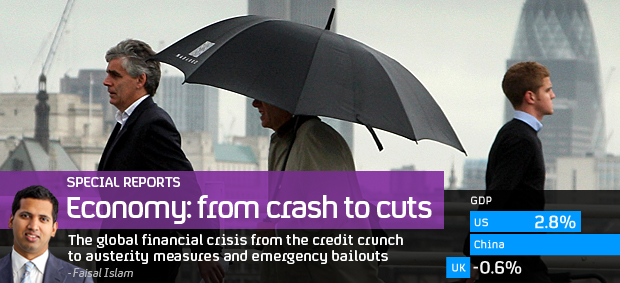Why Government economic policies never go to plan
It might be the weather, troubles abroad – or just the legacy of the past. But there often seems to be a reason why the Government’s plans for the economy never go quite to plan.

Official figures out today show the economy has grown by just 0.2 per cent in the second quarter of 2011.
The Office of National Statistics (ONS) suggested the April bank holidays, the royal wedding and the effects of the Japanese tsunami had all had an impact – although it warned other factors may be at play.
David Cameron insisted the figures were “positive news” and that there was no need for an economic plan B.
But the Prime Minister said rebuilding the economy would take time in the wake of the global financial collapse, which opponents might claim is something of an excuse for a Government promising to boost growth.
“Clearly it’s going to take time to make sure we produce the growth and the jobs that we need to really strengthen our economy,” said Mr Cameron during a visit to Caerphilly in Wales.
Vince Cable, the Liberal Democrat Business Secretary, also chose not to question whether the royal wedding was to blame for the sluggish growth. Instead, he echoed the Prime Minister’s comments.
We are still living with the aftershocks of the banking crisis and the recession. Vince Cable, Business Secretary
“We are still living with the aftershocks of the banking crisis and the recession, living standards have clearly been squeezed by imported commodity prices,” he said.
But he insisted the building blocks for more balanced and sustainable growth were now in place.
Chancellor George Osborne said it was positive the economy was growing and claimed abandoning the coalition’s deficit reduction strategy would risk British jobs and growth.
Analysis: Faisal Islam on why 0.2 per cent growth isn’t really growth at all
Wrong sort of weather
While the Chancellor appeared to steer clear of any “excuses” today, it was a different story six months ago when growth figures for the last quarter of 2010 were published. Then, Mr Osborne firmly laid the blame on snow for a shock contraction of the economy.
He leapt on that explanation by the ONS in the face of Labour criticism that the coalition was going too far and too fast in terms of spending cuts.
These are disappointing figures but the weather clearly had a huge effect. George Osborne, January 2011
Initial figures indicated that the gross domestic product (GDP) had fallen by 0.5 per cent, but were subsequently revised to around 0.6 per cent.
The Chancellor was more than happy to pin the blame on the winter during media interviews, mentioning the weather 17 times in one radio interview when the figures were released in January.
Interviewed by Channel 4 News, Mr Osborne said: “These are disappointing figures but the weather clearly had a huge effect and the Office for National Statistics, who put these numbers together, flagged that up very carefully and clearly and say as a result the numbers are somewhat uncertain.”
But the Government would not be blown off its chosen economic course by the bad weather, promised the Conservative Chancellor.
‘Deepest recession for decades’
When the next set of GDP figures between January and March this year showed the economy “flatlining”, the Chief Secretary to the Treasury was talking up the fact that the economy had grown by 0.5 per cent after contracting by that amount.
But appearing on Channel 4 News, Liberal Democrat Danny Alexander was more than happy to stress the economy was coming out of the “deepest recession we have had for many decades”.
And while former Labour Chancellor Alistair Darling was happy to have a go at Mr Osborne over his snow claims in January, his political opponents might point to his comments when he was in charge of the nation’s finances.
In his Budget speech in April 2009, Mr Darling pointed to a “global recession” and how the collapse in America of Lehman Brothers had brought the international financial system to its knees.
The “most serious global economic turmoil for over 60 years” also got the blame for Britain’s deficit, which Mr Darling promised to halve within four years. “The deepening global recession has had an impact on the public finances, here and in every country across the world,” said the then Labour chancellor.
-
Latest news
-
‘Government responsiveness should be improved’ says infected blood inquiry chair4m

-
Infected Blood scandal: How UK failed on a global scale4m

-
‘There’s a strong evidential basis’ for ICC to grant arrest warrants for Netanyahu, says criminal law expert4m

-
International Criminal Court prosecutor seeks arrest warrants for Israel PM and Hamas leaders3m

-
‘Highly unlikely there was foul play’ in Iran president helicopter crash, says Tehran professor5m

-





